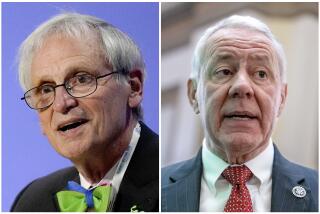Just Send In No-Clones, Then Send Out the Checks
- Share via
The circus was in town again this week.
Not this town--not Los Angeles. I mean Washington, D.C.
In Washington, D.C., the circus is always in town, except when it’s in recess and goes home to press the voting-age flesh.
Members of Congress have hotfooted it back to their districts to consult with constituents on matters of vital national significance, like Gary Condit’s future as a guest host on “Unsolved Mysteries,” and whether President Bush is being un-American by taking off the whole month of August like he was some French mailman.
But Congress left behind an understudy, a backup circus act: the National Academy of Sciences.
This week, science’s marbled halls (marble: a hard, crystalline or granular metamorphic limestone, much used in building) have resounded with something less than academically lofty noises.
All right, drop the grand language: it was like the Jerry Springer show with PhDs. Hollering and finger-pointing, all over the matter of human cloning, and the two fertility doctors who’ve said that, come November, they’re going into the cloning business.
Here’s a Springerian moment, from a hallway outside the conference: a Christian guy is nose to nose with a pro-cloning guy who runs a lamp store in Greenwich Village, and is outshouting him when the TV cameras get wind of a good video scrum and close in, and the Christian guy spins neatly around and looks right into the lens and says, “Hi, my name is Patrick Mahoney, and . . . we must not allow human life to be treated like lab animals!”
This is all Congress’ doing. The House of Representatives planted a little time bomb and high-tailed it out of town just ahead of this cloning conference: it voted to ban human cloning in any way, shape or form, and any scientist who tries it could get tossed in the pokey for 10 years (the only kind of term limits Congress supports).
Ladies, gentlemen, honorable members: all the hellfire-invoking and finger-wagging that accompanied the Human Cloning Prohibition Act of 2001 for the benefit of C-SPAN--completely unnecessary.
Banning something of this magnitude isn’t the American way. Just the word “prohibition” has failure and organized crime written all over it--an invitation to a cloning underground of cell-smugglers and Petri dish piracy.
Americans don’t use bans--they use bucks. This is the nation that has perfected the pay-not-to-play technique. For decades, the federal government has handed over millions to farmers not to grow certain crops. Hollywood spends millions on options, paying people not to sell their stories to some other producer. Movie-makers pay millions to writers to write screenplays that never get turned into movies.
So it should be with cloning, especially in a Republican-run house that believes incentives are more effective than rules.
Repeal the Human Cloning Prohibition Act of 2001 and pass the Human Anti-Cloning Subsidy Act of 2001. And bring the voters and taxpayers into the equation. Congress could set up a number, 1-888-NOCLONE, and for a tax-deductible $9.95 contribution, Americans could specify who should get the no-clone subsidy checks.
Now, if you want to waste your $9.95 call on naming Strom Thurmond, fine, but I’m happy to let nature take its course. There are so many other potential clonees; the sort of people who probably most long to be re-created are exactly the sort of people who should not be double-dipping in Nature’s test-tube:
The man who created reality TV, and Martha Stewart. Sen. Trent Lott and his barber. The Olsen Twins and Roger and Bill Clinton. Eminem and Puff Daddy. Rupert Murdoch and Don King. Brent Musberger and Bret Easton Ellis. Operators are standing by.
I’d lobby Congress on this myself, but as I said, the circus is in recess. I hope they haven’t all sneaked back home to beat the deadline on their own cloning ban and reproduce asexually, but maybe that’s the only way they can get it done.
Patt Morrison’s column appears Mondays and Wednesdays. Her e-mail address is [email protected].
More to Read
Sign up for Essential California
The most important California stories and recommendations in your inbox every morning.
You may occasionally receive promotional content from the Los Angeles Times.











